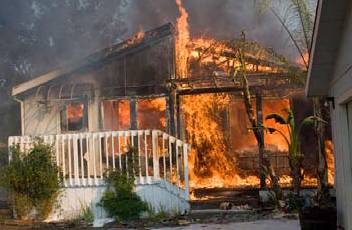Is Your Home Safe?
 Many homeowners don’t realize that behind the panel boxes and cover plates there could be electrical hazards that can result in fires or electric shock. Please check or have a licensed master electrician who has the necessary testing instruments verify the following:
Many homeowners don’t realize that behind the panel boxes and cover plates there could be electrical hazards that can result in fires or electric shock. Please check or have a licensed master electrician who has the necessary testing instruments verify the following:
Appliances
Make sure all appliance cords are in good condition, not frayed or cracked, and the ground prongs are intact. Have a licensed electrician replace all damaged cords.
Caution: If an appliance blows a fuse, trips a circuit breaker, or gives anyone a shock unplug it immediately and have it checked by a licensed electrician.
Circuit Breakers and Fuses
Have a licensed electrician verify that the circuit protection device (fuse or circuit breaker) for each circuit is properly sized in accordance with the National Electrical Code.
Caution: If a circuit breaker trips or a fuse blows, this indicates that there’s a failure in your electrical system. Resetting the circuit breaker to provide power without having it checked by a licensed electrician is not the best practice.
Arc-Fault Circuit Interrupters (AFCI)
The consumer product safety commission (CPSC) recommends that you add AFCI protection for all 15A and 20A, 125V circuits that aren’t GFCI protected, according to the requirements of the National Electrical Code.
Caution: Test AFCIs monthly and after every major lightning storm, http://www.cpsc.gov/CPSCPUB/PUBS/afcifac8.PDF
Cover Plates
To prevent electric shock, verify that all outlet cover plates are in good condition so that no wiring or electrical terminals are exposed, including outdoor receptacle covers.
Caution: Immediately replace any missing, cracked, or broken cover plate.
Electric Shock
If anyone EVER feels a “tingle” or shock when they touch metal parts, IMMEDIATELY contact a licensed electrician and have them locate and fix the hazardous condition.
Electromagnetic Fields (EMF)
Have a licensed electrician perform an EMF study with a Milligauss meter to locate and correct wiring errors; you’ll make your home safer from the possibility of a fire or electric shock as well as reduce any EMF health risks.
Extension Cords
Extension cords are only to be used on a temporary basis; they are not to be used as permanent household wiring.
Grounding – Appliances
To prevent electric shock, have a licensed electrician verify that all appliances are properly grounded.
Grounding – Electric Service
To prevent fires and damage to electrical equipment have a licensed electrician measure your house ground with a ground resistance meter to ensure that it has a value of 25 ohms or less.
Grounding – Receptacles
To prevent electric shock, have a licensed electrician verify the ground continuity of all 15A and 20A, 125V circuits with a ground continuity tester.
Ground Fault Circuit Interrupters (GFCIs)
The consumer product safety commission (CPSC) recommends that you have GFCI protection for all receptacles in areas where electricity and water are near each other, such as outdoors, in kitchens, bathrooms, workshops, garages, etc. in accordance with the National Electrical Code.
Caution: Test GFCIs monthly and after every major lightning storm, http://www.cpsc.gov/cpscpub/pubs/99.html
Light Bulbs
Make sure the bulbs in all fixtures are appropriate for their intended use and the wattage rating doesn’t exceed the lighting manufacturers’ recommendations
Plugs
Never remove the ground pin (the third prong) or use a “cheater plug” to make a three-prong plug fit a two-prong receptacle (in old homes); this can lead to an electrical shock. If you need to plug a three-prong plug into a two-prong receptacle, then you need the two-prong receptacle to be replaced with a three-prong receptacle of the GFCI type in accordance with the National Electrical Code.
Power Strips
A heavy reliance on power strips is an indication that you need additional receptacle outlets that should be added by a licensed electrician.
Receptacles
To prevent a fire by the overheating of receptacle terminals, have an electrician verify that all wire terminations are secured to the receptacle via a screw and not by a push-in terminal.
Terminals
To prevent a fire as a result of terminals overheating, have a licensed electrician measure the operating temperatures of large terminals with a thermometer; and repair those that show excessive operating temperatures.
Caution: All electrical terminals at panels, disconnects, receptacles and switches need to be torqued to the manufacturers’ recommendations.
Surge Protection
To prevent fires and damage to expensive electronic equipment from lightning, be sure your home has a properly designed surge protection system installed by a licensed electrician.
Tamper Resistant Protection
The consumer product safety commission recommends that all 15A or 20A, 125V receptacles accessible to small children be of the tamper resistant type in accordance with the National Electrical Code.
Caution: Don’t depend on the plastic protector plugs to protect young children, they’re often removed and not replaced. Have a licensed electrician make the necessary changes.
By Mike Holt